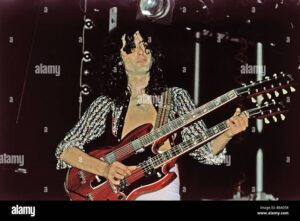The Led Zeppelin Song Jimmy Page Wants to Be Remembered For: “One of My Favourites”
Jimmy Page, the legendary guitarist and founder of Led Zeppelin, has contributed to some of the most iconic and groundbreaking songs in rock history. From the thunderous riffs of “Whole Lotta Love” to the haunting beauty of “Stairway to Heaven,” Page’s signature style helped redefine what rock music could be. With such a towering catalog, it’s natural to wonder which song Page himself holds in the highest regard. Surprisingly, it’s not the Zeppelin mega-hits that fans might expect. When asked about the song he would most like to be remembered for, Jimmy Page has pointed to “Kashmir” — a sprawling, mystical epic from the band’s 1975 album Physical Graffiti — calling it “one of my favourites.”
Why “Kashmir”?
“Kashmir” stands as one of Led Zeppelin’s most ambitious and enduring compositions. Clocking in at over eight minutes, the track is a masterclass in tension, exotic influences, and controlled grandeur. It’s not just another rock song — it’s a sonic journey. Page has spoken often about the uniqueness of “Kashmir,” calling it a pivotal moment in the band’s evolution. He once remarked, “‘Kashmir’ really has to be one of my favourites. It was so different, yet it still sounded like Led Zeppelin.”

What makes “Kashmir” so remarkable is its structure and texture. Unlike most rock songs driven by blues-based progressions, “Kashmir” relies on a hypnotic, modal riff played in DADGAD tuning — a method Page borrowed from folk and Indian music. This gives the song its distinct, droning quality, evoking the deserts and ancient cities that inspired the lyrics. Interestingly, the song isn’t actually about Kashmir, the region in northern India and Pakistan, but rather a trip Robert Plant took through Morocco. The name “Kashmir” was chosen for its evocative sound and mystique.
Page worked closely with drummer John Bonham to lock in the unusual 3/4 riff against a 4/4 beat, creating a polyrhythmic groove that’s mesmerizing and powerful. The orchestral arrangement, added later, layered strings and brass over the core track, further enhancing its cinematic feel. Jimmy Page has referred to the orchestration as “essential to its majesty.”
A Song Ahead of Its Time
“Kashmir” wasn’t an immediate radio hit like “Black Dog” or “Rock and Roll,” but its impact has grown immensely over time. Many musicians and critics now consider it among Zeppelin’s finest works, a view Page shares. What sets it apart, even for him, is its compositional depth. “I knew instantly it was something special,” Page recalled in an interview. “The riff had a power and a mystery to it that we hadn’t done before. It was a whole other path we were going down.”
Indeed, “Kashmir” represented Led Zeppelin’s bold willingness to push beyond traditional rock formats. The track combines elements of hard rock, world music, classical orchestration, and progressive composition. Page’s vision and production skills brought it all together seamlessly. He has often said that the song captures the essence of Led Zeppelin’s adventurous spirit — the desire to explore uncharted musical territories without losing their primal force.
Page’s Personal Connection
Part of why “Kashmir” holds such importance for Jimmy Page lies in the song’s complexity and the personal pride he takes in its creation. As the band’s producer, Page oversaw every detail of the recording. It was a culmination of everything he had learned as a session musician, producer, and innovator. Unlike “Stairway to Heaven,” which has become something of a rock cliché due to its ubiquity, “Kashmir” remains mysterious and fresh even decades later.

In a 2012 interview, Page explained, “It’s the pride of Led Zeppelin, in a way. That and ‘Achilles Last Stand’ are the songs I think of when I think about what we were really capable of.” He also emphasized that “Kashmir” was one of the rare tracks where all four band members contributed something indispensable — from Plant’s evocative lyrics to Bonham’s thunderous drumming and John Paul Jones’s orchestral touches. This perfect blend is part of what makes “Kashmir” such a monumental track.
Legacy
Today, “Kashmir” remains a staple in rock culture. It has been covered by symphonies, sampled in hip-hop (notably by Puff Daddy for the 1998 track “Come with Me” on the Godzilla soundtrack), and cited by countless musicians as a source of inspiration. It is also one of the songs that Page has performed live most consistently in his post-Zeppelin career, including in his work with the Black Crowes and at the celebrated 2007 Led Zeppelin reunion at the O2 Arena in London.
Jimmy Page’s choice to be remembered for “Kashmir” speaks volumes. It is not just about guitar virtuosity, although there is plenty of that. It’s about vision, experimentation, and the successful fusion of global sounds into a coherent and powerful rock anthem. For Page, “Kashmir” is more than a song — it’s a legacy in motion, a testament to Led Zeppelin’s fearless creativity and his own genius as a composer and producer.













